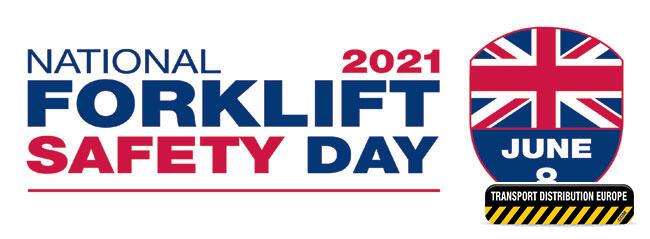UKMHA chooses National Forklift Safety Day for official launch
Jun 01, 2021
As part of its ongoing commitment to promote good safety protocols throughout the material handling industry, the UK Material Handling Association will be marking its official launch in conjunction with this year’s National Forklift Safety Day (NFSD).

NFSD 2021 takes place on Tuesday 8 June and is being promoted for the first time by the UK Material Handling Association, the new voice in UK material handling formed by the merger of the industry’s two most respected trade associations – BITA (British Industrial Truck Association) and the FLTA (Fork Lift Truck Association).
As promoting good safety standards within the material handling industry is one of the UKMHA’s core goals, it has opted to use 8 June for its own launch event so that it can highlight to an engaged audience just how it will be helping the industry moving forward.
It has planned a live webinar for the day where senior management will outline why the material handling industry plays such a key role in the UK economy. They will also outline how the association will work, what its objectives are and how the merger is intended to strengthen the offering of the combined organisations, enhancing the services delivered to members and all those who own and operate forklift trucks.
“The arrival of the UK Material Handling Association is a gamechanger for the industry and with our strong focus on improving safety standards, we could not have a better day to celebrate our formation than National Forklift Safety Day,” said UKMHA CEO, Tim Waples.
For the 2021 NFSD campaign, the new body has chosen to focus on the importance of accredited Thorough Examination. The campaign will coincide with the publication of an updated BITA GN28 - the industry approved guideline on Thorough Examination and Safety Inspection of Industrial Lift Trucks in accordance with the provisions of LOLER (Lifting Operations and Lifting Equipment Regulations) 1998 and PUWER (Provision and Use of Work Equipment Regulations) 1998.
The campaign could not be timelier. As industry emerges from the latest COVID-19 lockdown, companies reliant on material handling equipment must ensure their MHE is in good condition with no dangerous defects or deterioration.
David Goss, Technical Director, UK Material Handling Association said: “If MHE has been idle during lockdown, then management has a responsibility to ensure it is safely recommissioned and the best way of ensuring this is to have the equipment examined by a suitably qualified competent person.”
Best practice is to put the equipment through a Consolidated Fork Truck Services (CFTS) inspection known as Thorough Examination.
Thorough Examination is the name given to the mandatory inspection required by law to ensure that the lifting equipment is in safe working order. It is roughly equivalent to the MOT for cars.
UKMHA is recommending that all Thorough Examinations should be completed by a CFTS-accredited Competent Person. The CFTS mark is a guarantee that a lift truck will be examined carefully, and that key components such as brakes and steering will also be checked along with the lifting mechanism.
“All MHE must receive a Thorough Examination at least once a year. However, examinations could be required more often depending on the type of truck and the application,” added Goss.
“The process is governed by regulations enforced by the Health and Safety Executive (HSE). These state that Thorough Examination of industrial lift trucks is required under LOLER 1998, which covers lifting equipment, and safety inspections of other safety-related items, such as brakes, steering and tyres, are required under PUWER 1998.”
It is important to highlight that regular inspections as part of a preventive maintenance scheme or scheduled service do not meet the legal requirements for a Thorough Examination. Thorough Examinations can only be carried out by people deemed competent, and these people are under a legal obligation to report dangerous defects to the authorities.
It is crucial to ensure that individual Thorough Examinations comprehensively cover both the lifting and the drivingmechanisms of the truck, because not all of them do. Some examinations only cover LOLER, which could put equipment, operators and businesses at risk.
In addition, the Health and Safety at Work Act 1974 gives every employer a duty of care to their employees and any truck that has not had its brakes, steering or structural integrity checked is not considered safe.
The updated GN28, which is free to members of BITA and FLTA, incorporates several changes to the current guidelines, including clarification around the date of first examination, confirmation on requirements for lorry-mounted trucks, recommended intervals between examinations for attachments, and improved guidance on inspection and test criteria.
